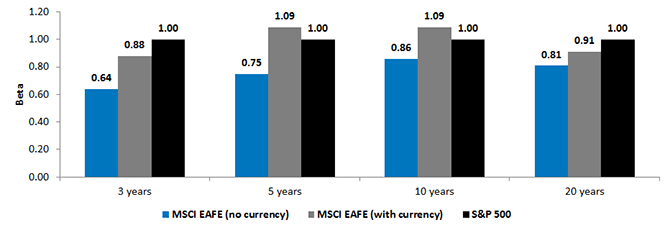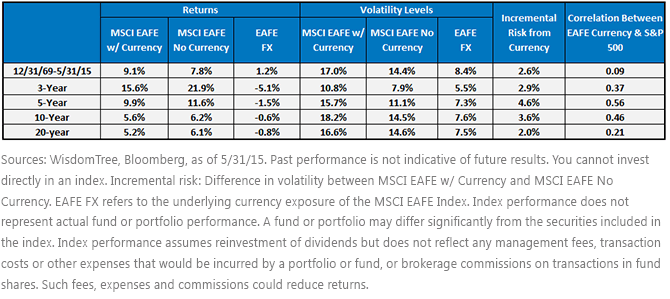Is There a Currency Hedged Smart Beta Alternative to EAFE?



 For definitions of terms and indexes in the chart, visit our glossary.
If an investor had targeted the local returns of EAFE for the past three, five, 10 or 20 years, the returns would have been higher without the currency exposure than with it. Moreover, currency exposure added several percentage points of incremental volatility to international equity exposure in each period shown above, going back to 1970. And while having the currency exposure may have provided some diversification benefit several decades ago, the correlation between the EAFE currencies and the S&P 500 has been rising in the past decade compared to where it had been over the past 20 or 40 years.
All this raises a question: Should investors be 100% unhedged in their core international equity exposure, especially given the low cost of hedging developed world currencies today with interest rates in Japan and Europe at or below 0%?
One way to help generate higher risk-adjusted returns is by reducing overall volatility. The other is by generating returns that exceed those of a comparable cap-weighting index. In WisdomTree’s case, we have been doing so with several of our broad-based Indexes that have some of the longest track records in the fundamentally weighted indexing space.
Smart Beta International Equities: Real-Time Results
For example, the WisdomTree DEFA Index, a broad measure of the dividend-paying segment of developed equity markets outside the U.S. and Canada, has outperformed the MSCI EAFE Index by 90 basis points (bps) on an annualized basis since its inception in June 2006 for more information on the WT DEFA Index, click to this recent blog post.
For investors looking to access the same equity methodology of the WisdomTree DEFA Index while mitigating the impact of foreign currency movements, WisdomTree recently launched a currency-hedged version of the WisdomTree DEFA Index called the WisdomTree International Hedged Equity Index.
The WisdomTree International Hedged Equity Index mitigates the impact of 12 distinct foreign currencies, and it does so with an estimated annual cost to hedge of just 0.13%. Because the Index of some 2,300 dividend-paying stocks is dividend weighted and rebalanced annually, it will have different country and sector weights than the MSCI EAFE Index. The International Hedged Equity Index also exhibits a higher trailing dividend yield—3.98% as of June 19, compared to a trailing dividend yield of 3.12% for the MSCI EAFE Index.
Conclusion: Creating Higher Risk-Adjusted Returns over Time Can Create Value for Investors
Using dividend-paying stocks and dividend weighting, the WisdomTree DEFA Index has helped to generate higher returns compared to the MSCI EAFE Index over the last nine years. If WisdomTree can reduce volatility even further by removing the impact of foreign currencies, the WisdomTree International Hedged Equity Index may represent a valuable tool for investors looking to push the efficient frontier even more to the north/northwest quadrant.1
For investors interested in the strategy, the WisdomTree International Hedged Equity Fund is designed to track the performance of the WisdomTree International Hedged Equity Index before fees and expenses.
1Describes the capability to potentially maximize returns for any given level of risk.
For definitions of terms and indexes in the chart, visit our glossary.
If an investor had targeted the local returns of EAFE for the past three, five, 10 or 20 years, the returns would have been higher without the currency exposure than with it. Moreover, currency exposure added several percentage points of incremental volatility to international equity exposure in each period shown above, going back to 1970. And while having the currency exposure may have provided some diversification benefit several decades ago, the correlation between the EAFE currencies and the S&P 500 has been rising in the past decade compared to where it had been over the past 20 or 40 years.
All this raises a question: Should investors be 100% unhedged in their core international equity exposure, especially given the low cost of hedging developed world currencies today with interest rates in Japan and Europe at or below 0%?
One way to help generate higher risk-adjusted returns is by reducing overall volatility. The other is by generating returns that exceed those of a comparable cap-weighting index. In WisdomTree’s case, we have been doing so with several of our broad-based Indexes that have some of the longest track records in the fundamentally weighted indexing space.
Smart Beta International Equities: Real-Time Results
For example, the WisdomTree DEFA Index, a broad measure of the dividend-paying segment of developed equity markets outside the U.S. and Canada, has outperformed the MSCI EAFE Index by 90 basis points (bps) on an annualized basis since its inception in June 2006 for more information on the WT DEFA Index, click to this recent blog post.
For investors looking to access the same equity methodology of the WisdomTree DEFA Index while mitigating the impact of foreign currency movements, WisdomTree recently launched a currency-hedged version of the WisdomTree DEFA Index called the WisdomTree International Hedged Equity Index.
The WisdomTree International Hedged Equity Index mitigates the impact of 12 distinct foreign currencies, and it does so with an estimated annual cost to hedge of just 0.13%. Because the Index of some 2,300 dividend-paying stocks is dividend weighted and rebalanced annually, it will have different country and sector weights than the MSCI EAFE Index. The International Hedged Equity Index also exhibits a higher trailing dividend yield—3.98% as of June 19, compared to a trailing dividend yield of 3.12% for the MSCI EAFE Index.
Conclusion: Creating Higher Risk-Adjusted Returns over Time Can Create Value for Investors
Using dividend-paying stocks and dividend weighting, the WisdomTree DEFA Index has helped to generate higher returns compared to the MSCI EAFE Index over the last nine years. If WisdomTree can reduce volatility even further by removing the impact of foreign currencies, the WisdomTree International Hedged Equity Index may represent a valuable tool for investors looking to push the efficient frontier even more to the north/northwest quadrant.1
For investors interested in the strategy, the WisdomTree International Hedged Equity Fund is designed to track the performance of the WisdomTree International Hedged Equity Index before fees and expenses.
1Describes the capability to potentially maximize returns for any given level of risk.
Important Risks Related to this Article
HDWM is new and has limited operating history. There are risks associated with investing, including possible loss of principal. Foreign investing involves special risks, such as risk of loss from currency fluctuation or political or economic uncertainty. To the extent the Fund invests a significant portion of its assets in the securities of companies in a single country or region, it is likely to be impacted by the events or conditions affecting that country or region. The Fund’s exposure to certain sectors may increase its vulnerability to any single economic or regulatory development related to such sectors. The Fund uses various strategies to attempt to minimize the impact of changes in foreign currency against the U.S. dollar, which may not be successful. Derivative investments can be volatile, and these investments may be less liquid than other securities, and more sensitive to the effects of varied economic conditions. Due to the investment strategy of the Fund, it may make higher capital gain distributions than other ETFs. Please read the Fund’s prospectus for specific details regarding the Fund’s risk profile.


